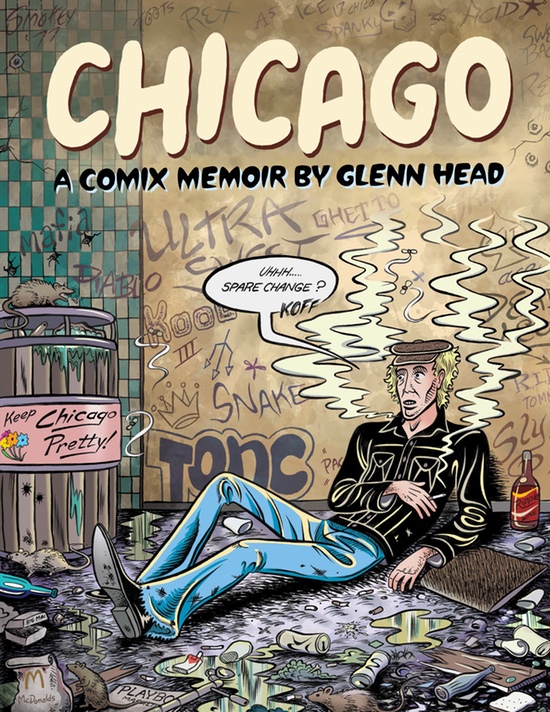Cinemas are always full of comic book adaptations, and that’s probably a good thing for comics (not always so good for movies, but that’s another story). I don’t tend to see the kind of thing I like to read so well represented on screen, however. Ghost World was a long time ago. I’d forgotten just how bleakly brilliant it is until I showed it to a class of sixth formers as part of my exit from the world of teaching Film Studies, leaving them thoroughly disheartened. American Splendor is another example of a brilliant adaptation, but that’s a fair while ago too. Great, therefore, to see the overwhelmingly positive reviews of The Diary Of A Teenage Girl, adapted by Phoebe Gloeckner from her novel, a mix of prose and comic strips. It’s a shame it wasn’t as widely seen as it might have been, no doubt in part due to a BBFC certification that ensures few teenage girls will have been able to have watched it at the cinema. Hopefully it will reach a larger audience once it’s available for home viewing. Gloeckner wrote the introduction to Glenn Head’s Chicago, reviewed below.
We’ve got reviews of great Drawn & Quarterly and Fantagraphics titles this month, as usual. For those who prefer to read their comics digitally, both publishers recently signed new deals with Amazon and now have an excellent selection of their publications available on the Kindle store as well as on the Comixology app. In other industry news, Avery Hill in the UK has joined forces with Retrofit Comics in the US to distribute some of each other’s titles. Good times for fans of all four publishers.
On to the comics – plenty of must-buys this month.
Anders Nilsen – Poetry Is Useless (Drawn & Quarterly)
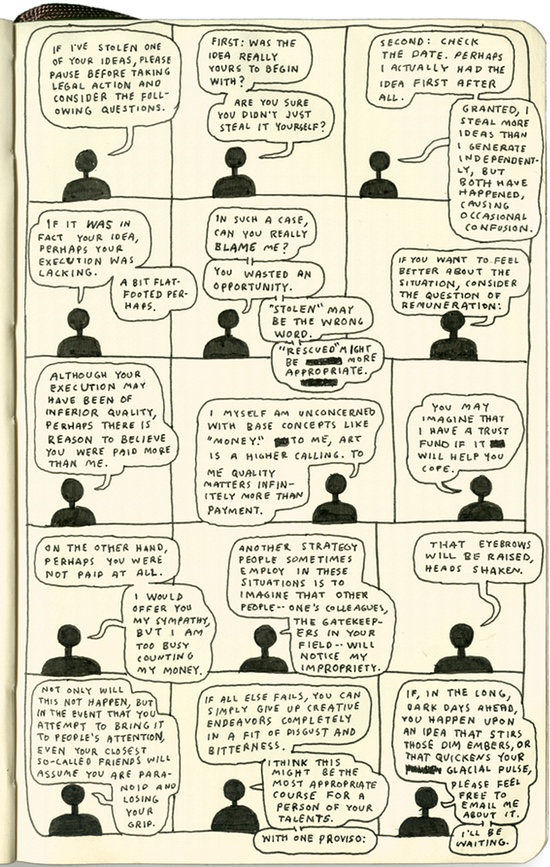
Sketchbooks are often less appealing than other forms of comic – there’s no doubt some provide fascinating insight into the development of other work or into a cartoonist’s state of mind during a book tour, for example, but this is not necessarily sufficient to maintain interest over the length of a book. Sometimes they have the feel of those ‘deluxe’ album reissues where the brilliance of the original is diluted by all the extra tracks, unfinished sketches or songs that just weren’t good enough to include the first time around. It’s not always a good idea to think too carefully about what went into that sausage.
Anders Nilsen, however, has produced something frequently quite profound. Featuring more than 200 pages selected and copied from various diaries, a lot of this has already appeared on his blog. Pages are often scanned in straight from a notebook much smaller than the pages in this volume, leaving copious white space dotted with additional drawings below. There’s a real mixture of content here: short strips, travelogues, abstract images, observational sketches and a dizzying array of philosophical meditations (often on religion vs atheism, and the subjectivity of interpretations of the world). These tend to be presented in the format of aphorisms expressed by a simple silhouette. Sometimes the text is methodically crossed out, leaving the reader wondering what thoughts were retracted.
As is so often the case with D&Q, this is a beautifully bound and presented edition. It’s a stellar example of the form, a book to be savoured and not rushed, which leaves the reader in awe of Nilsen’s talent, and insight. Certainly no news to his fans, but this is that rarest of sketchbooks, a perfect introduction to a cartoonist’s work. Unquestionably one of the standout releases of the year.
Glenn Head – Chicago (Fantagraphics)
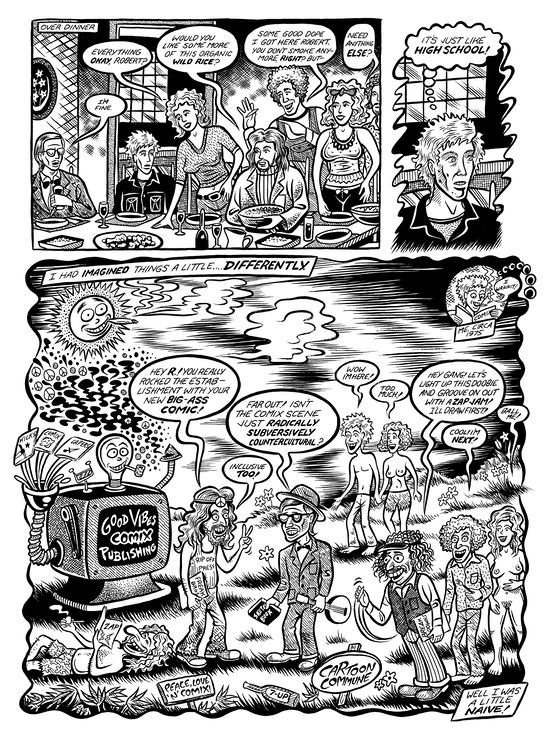
Glenn Head’s Chicago is a new release, but has the unmistakable look of comix from the 70s rather than comics from the present. Head has considerable form in this area, for example having been published in R.Crumb’s Weirdo, in Bad News and Snake Eyes (which he co-edited). It’s an autobiographical account of parts of his life and career, and it’s interesting to see something in this style that covers such a long period.
The protagonist, Glen (one ’n’ removed to indicate that this book is not the whole story, but what the author is choosing to present for us) is depicted in his formative years, moving from late-teen family life through art school in Cleveland to virtually living rough in Chicago while he tries to gain a foothold in comics, and then finally to adult family life.
Central to the book are three relationships. We first encounter Sarah when Glen is 19, and there’s an obvious attraction left unfulfilled. She appears later, in one of the book’s extended sequences, and again at the end. His relationship with his father is also interesting. His Wall Street job provides the high standard of living Glen is used to, and there’s a predictable generational culture clash. However, he’s less judgemental than one might expect, and in many ways he saves Glen from his youthful follies without rejecting him, displaying considerable wisdom throughout. Finally, Aaron, a kindly stranger, finds Glen at his lowest, when he moves to Chicago but without money or accommodation, and gives him somewhere to crash. He only appears on a few pages but without Aaron, it’s hard to imagine things would have turned out well.
This book is unusual for presenting a more modern autobiographical graphic novel in the style of comix. It’s an interesting tale, well told and presented in a distinctive and engaging style, with fantastic artwork.
Noah Van Sciver – Fante Bukowski (Fantagraphics)
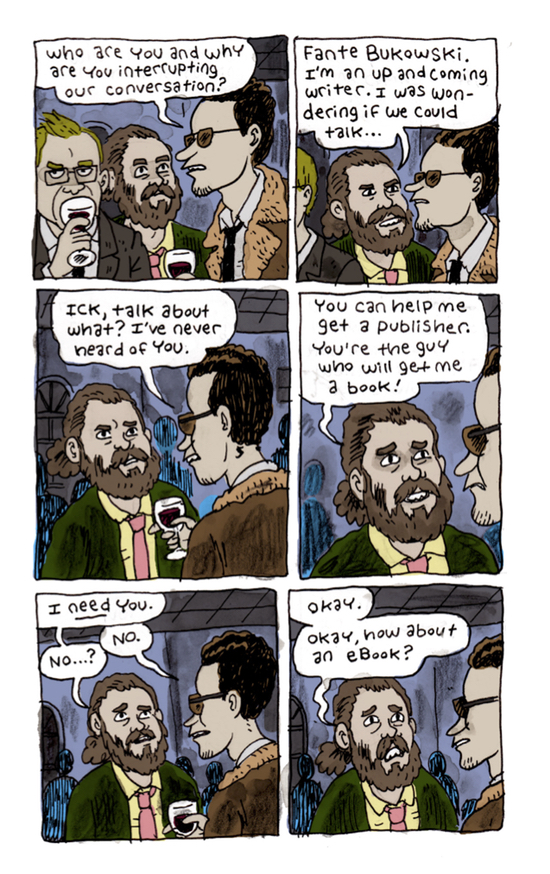
Fantagraphics has just released a new Noah Van Sciver book, Fante Bukowski, following on from the Ignatz-nominated Saint Cole reviewed here recently. This is a little shorter and in colour, with the same instantly recognisable style.
Fante Bukowski is 23, and seeks literary success. However, he lacks talent and inspiration, and intermittently admits to himself that this might be a problem. Bemoaning the fact that he’s been trying to become a famous writer for a year and he’s still unpublished, when he does secure publication in a journal run by the only person who will talk to him at a literary party, it turns out to have a print run of just 24 copies. The poem in question is a bratty demand for acceptance to his father, whose disapproval looms large over the story.
When he meets and seduces a published author at a poetry reading, she brilliantly skewers him on every level, from his name change (“I have read every one of Bukowski’s books. He changed my life, so I changed my name”) which she describes as the worst thing she’s ever heard, to his tattoo.
This is a much more playful work than Saint Cole. As well as the poem, The Tragedy Of Success, (“Nothing I do is ever good enough for my Dad”), the way another wannabe writer is fobbed off by Dave Eggers is brilliantly funny. When Bukowski asks an agent for a story idea he’s given ‘ugly loser writer struggles for fame and fortune’. It’s a cruel world out there. At the rate Van Sciver is being published he has little in common with the characters in this book, but at the same time it’s clear he’s not some super-confident egotist awaiting the rest of the world to catch up with his own delusions of grandeur. Bukowski comes across as a fondly comic exaggeration of writerly insecurity rather than someone the author despises or pities. Van Sciver has produced another portrait of a flawed character that mixes wit and insight. Recommended.
Joan Cornellà – Mox Nox (Fantagraphics)
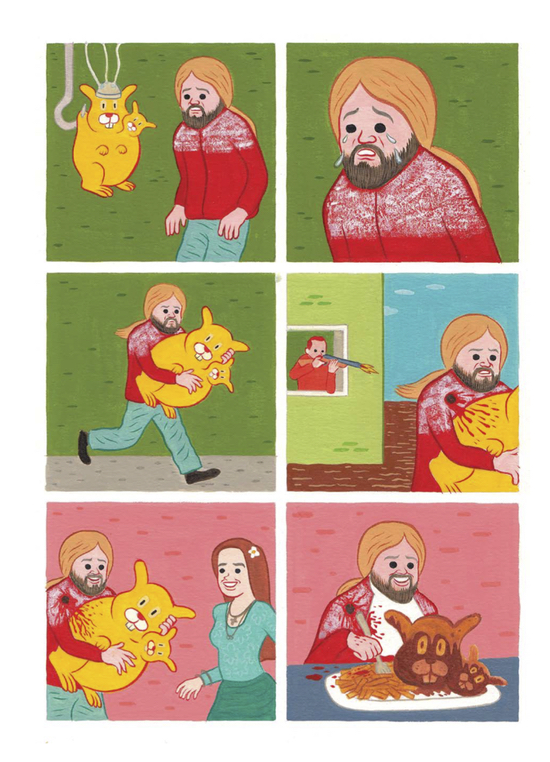
Are you easily appalled? If so, this might not be for you. This book comprises beautifully painted single page wordless gag cartoons likely to challenge those with even a rudimentary capacity for taking offence. They feature a range of characters – human, animal, human dressed as animal, unknown – in a variety of absurdist situations, with shockingly funny payoffs.
Nearly all the characters feature the same facial expression, a psychopathic smile, regardless of what appalling event they have witnessed, carried out or been the victim of. It’s pretty easy to figure out if this book is of interest – just look at a couple of preview pages, and if you think they are great, you’ll love it. If you are horrified, best avoid. I loved it. If you have small children, you probably shouldn’t leave it lying around, though. They’ll be attracted to the colourful images but may never be the same again.
Gabrielle Bell – Truth Is Fragmentary – (Uncivilized)
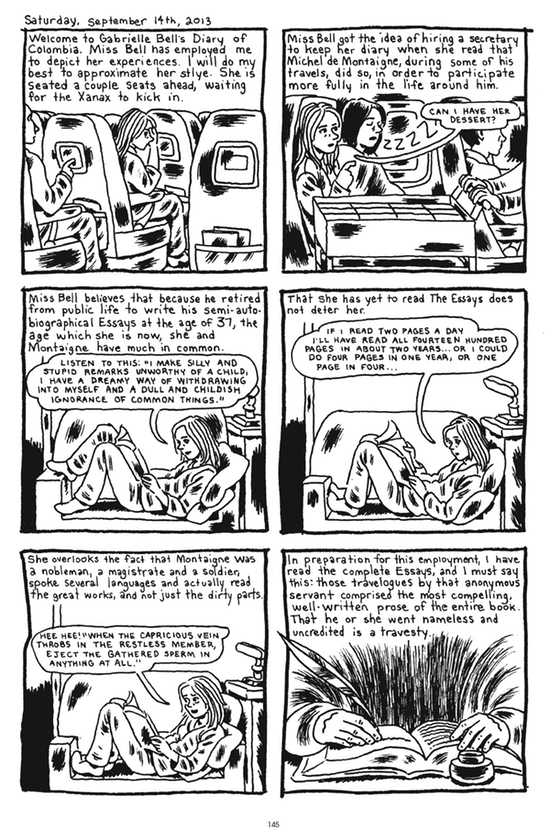
Although she has published fiction, Gabrielle Bell is best known for her excellent journal comics, from 2003’s Lucky onwards. Truth Is Fragmentary follows on from her previous Uncivilised book, The Voyeurs, and focuses particularly on her travels between 2010 and 2013 as she attends various comics festivals around the world. Although on one level it’s a shame there are fewer full colour pages than in The Voyeurs, the simple black and white pages convey the authenticity of a diary more honestly, and are what readers of her website will be used to.
Every July Bell keeps a daily comic diary, and three of those are included here. At times, there’s a frustrating tendency for these to lapse into accounts of how difficult it is to write a daily comic diary. However, this struggle also leads her into entertaining situations where she seeks out experiences to provide material, and to bizarre, hallucinatory stories of bears, an apocalypse and more. The July 2013 diary, when she rents an apartment in the country as a self-created writer’s residency, is one of the two strongest sections in the book.
The other is the account of her trip to Columbia in 2013. This is written as if she employed a secretary to write on her behalf, a device that works brilliantly, and is a nod to the philosopher and essayist Michel de Montaigne, who she also refers to in that year’s July Diary. Bell portrays herself as someone quite ill at ease in the sort of social situations her travels lead to, with wryly amusing results.
Bell’s art is deceptively simple, and subtle changes in the set of her shoulders or her smile convey a great deal. When you compare her more recent work to the look of older material such as 2003’s When I’m Old And Other Stories, it’s immediately obvious how much more effective her drawing style is now, and how she has matured as a cartoonist. If you’ve enjoyed her autobiography before, Truth Is Fragmentary is worth definitely picking up. If not, either this or The Voyeurs are excellent introductions to this talented, introspective artist.

